homewares inspection: A Comprehensive Guide
As a homeware enthusiast, you understand the importance of quality items that stand the test of time. Proper care and maintenance can keep your homewares in excellent condition for years, but there comes a time when a thorough inspection is necessary. In this article, we will cover the importance of homewares inspection and what you should focus on when conducting one.
What is Homeware Inspection?
Homeware inspection is the process of evaluating the quality and condition of household items. This includes everything from appliances and electronics to furniture and decor. A thorough inspection can identify potential defects or hazards and allow you to take corrective measures to avoid any problems.
Why is Homeware Inspection Important?
Several reasons make homeware inspection crucial. Firstly, it ensures safety. A faulty appliance or piece of furniture can expose you and your family to harm. Secondly, it helps you detect problems early. By catching defects early, you can avoid costly repairs or replacements. Lastly, homeware inspection can assure you of the quality of your purchases. It is common for retailers to sell defective or substandard items. Regular inspections can help you identify such products and return them before it's too late.
When Should You Carry Out a Homeware Inspection?
You should perform homeware inspection regularly. Monthly or bi-monthly assessments can help you identify problems before they escalate. You should also check newly acquired homewares before putting them to use. Should you come across a defect, contact the manufacturer or retailer immediately. Don't ignore safety concerns or defective products.
How to Conduct Homeware Inspection
Homeware inspection requires a systematic approach. You should focus on specific areas, including:
- Cables and wires - check for frays or cuts that could lead to electrocution or fire
- Plugs and sockets - ensure they are firmly in place and functioning correctly
- Drawers and hinges - assess the quality of construction, noting any signs of wear and tear
- Wooden surfaces and frames - check for cracks or swelling that could affect the item's structural integrity
- Appliance housing - look for plastic bits that may be broken or missing
- Water appliances -check for leaks and blockages that could encourage dampness and mold
What Should You Do After Homeware Inspection?
After identifying defects or hazards, you should take appropriate action. If the item is repairable, fix it immediately. If the problem is severe or not rectifiable, you should discard or replace the item. Remember always to follow the manufacturer's guidelines on disposal.
Can You Perform Homeware Inspection Yourself?
Yes, you can inspect your homewares by yourself. However, if you are not confident with your skills, it is better to seek professional help. Some manufacturers offer repair and inspection services at a fee. You can also use online guides to inspect complex homewares like appliances and electronics.
What Are the Benefits of Homeware Inspection?
The primary advantage of homeware inspection is that it ensures the safety of you and your family. It also saves you money by preventing costly repairs or replacements. Additionally, homeware inspection reassures you that you purchased quality products that meet the manufacturer's specifications.
In Conclusion
Homeware inspection is a crucial process that every homeware owner should undertake regularly. It involves evaluating all your household items, identifying potential safety hazards, and making necessary corrections. Regular homeware inspection ensures the safety of you and your family, prevents costly repairs and replacements, and ensures you have quality homewares. Ensure you follow the guidelines provided by the manufacturers or if you lack confidence in your skills seek the services of professionals.

